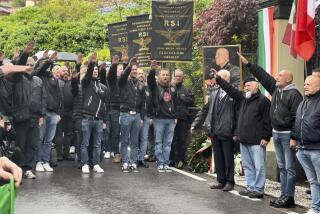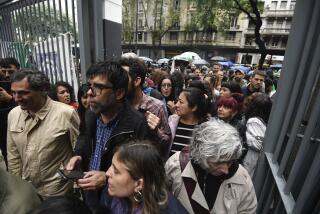Italians Turn Out Against Berlusconi’s Policies : Europe: Millions of workers strike to protest cuts in social benefits. Rallies are some of the largest since the 1970s.
- Share via
ROME — In a heady spring of renewal, political rookie Silvio Berlusconi came to power promising Italy a million jobs and no new taxes. Now, in a restless and noisy autumn six months later, Berlusconi is the butt of economic disarray and social discontent among some of the same Italians who cheered him to office.
On Friday, millions of workers struck in massive protest against their billionaire prime minister’s quest to balance the books of a country accustomed to living beyond its means.
Berlusconi himself was far from the madding crowds Friday--in Moscow on a trade mission--but it seemed as if everybody else was in the streets of Italy. Huge rallies in sunlit piazzas up and down the peninsula were some of the largest since the 1970s.
Called by the country’s three largest unions, the strike protested Berlusconi’s first budget, an adventure in austerity aimed at lopping a third off a swollen government deficit of about $100 billion. Planned pension pruning is what outrages Italians most.
Labor leaders claimed more than 3 million marchers in the dozen largest cities. Police saw about two-thirds that number in protests that were sometimes angry but everywhere peaceful.
Demonstrators marched in bright sunshine behind drums, trumpets, whistles, flags, banners and catcalls in more than 30 cities, jamming landmarks such as Piazza Santa Croce in Florence, Piazza del Duomo in Milan and Piazza San Giovanni in Laterano in Rome.
The strike was nationwide and nominally for four hours, but many workers stayed away all day. Rail and air service was chaotic, with disruptions and cancellations even after their sector strikes ended.
Private shops and businesses were open, but schools, banks, government offices and many factories closed. Buses stopped in nearly every city, and there were walkouts by hospital workers, immigration and customs officials and traffic police. “Berlusconi Out” was a favorite placard in Rome.
The biggest march, more than 200,000 strong, was in Milan, Italy’s industrial heart and Berlusconi’s hometown. Among the strikers there were workers from companies in his Fininvest empire, which had revenue of about $7 billion last year.
“The government says it hasn’t touched people’s rights, and it’s true--it’s simply canceled them,” said union leader Pietro Larizza in Milan. He termed the protest “a gigantic vote of no confidence in the budget.”
In Moscow for talks with President Boris N. Yeltsin, Berlusconi did not seem impressed by the protests.
“You can’t change the numbers, not with one strike, or with 10 strikes. The numbers are there. I found them; I didn’t produce them,” he told reporters.
At the head of a right-wing, free-market coalition, Berlusconi is seeking parliamentary approval for a budget that would cut about $33 billion from Italy’s chronic deficit, reducing it to below 8.5% of GNP in 1995.
Most of the cuts would come from social programs that were sacred cows of previous governments led by political parties that have since collapsed in corruption scandals.
Berlusconi seeks reductions in spending on schools, defense, scientific research and health care, but the lion’s share of the cuts are aimed at one of Europe’s most generous--and corrupt--pension systems.
Nearly a third of Italians draw pensions. Women can retire at 56 and men at 61, but in some cases pensions are available at as much as 80% of final salary after as little as 15 years’ work.
In southern Italy particularly, tens of thousands of able-bodied citizens with political friends live off disability pensions.
The government is seeking to freeze early retirements and cut benefits as part of an austerity needed to reduce a government debt equal to 123% of last year’s GNP. Economists applaud the austerity as a necessary tonic after years of overspending.
More to Read
Sign up for Essential California
The most important California stories and recommendations in your inbox every morning.
You may occasionally receive promotional content from the Los Angeles Times.










